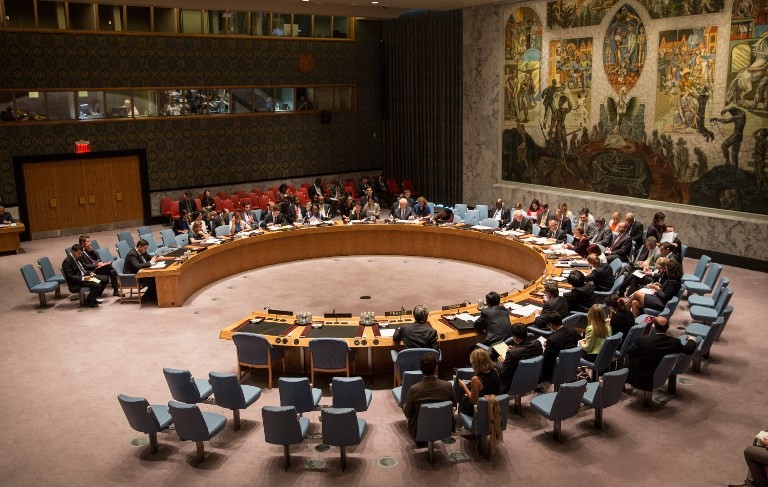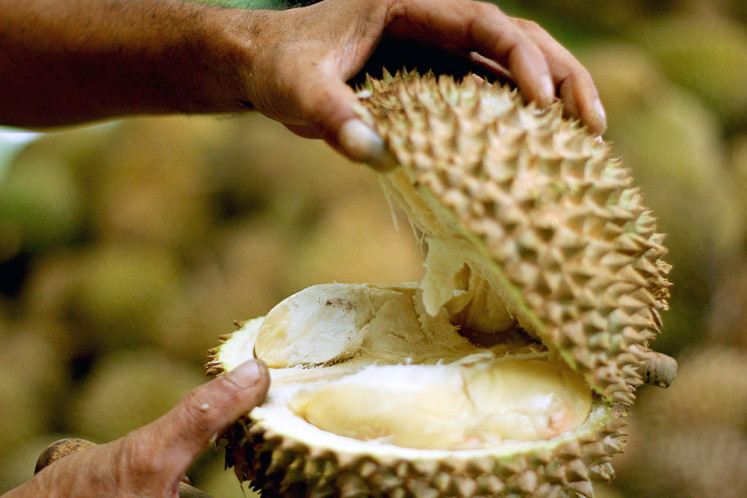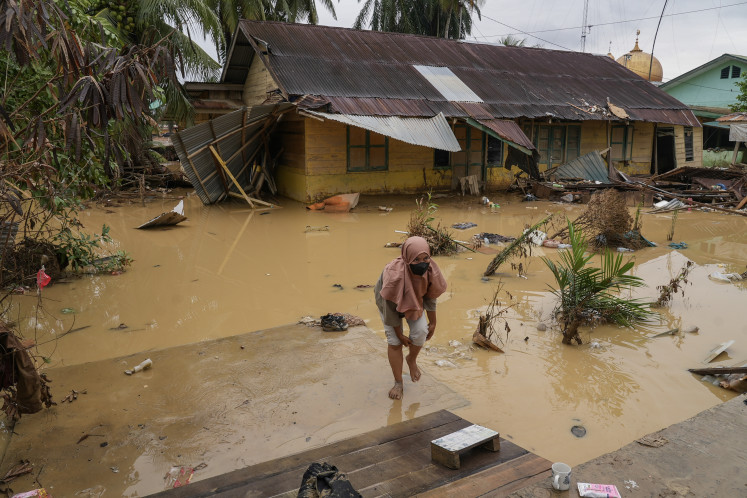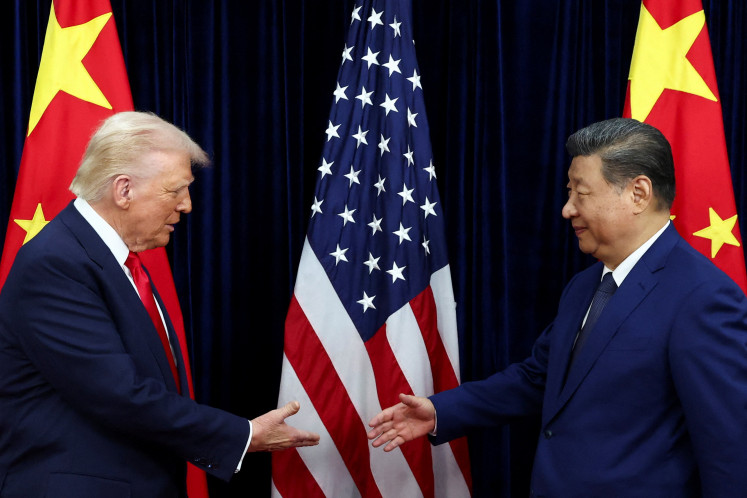Popular Reads
Top Results
Can't find what you're looking for?
View all search resultsPopular Reads
Top Results
Can't find what you're looking for?
View all search resultsIndonesia's UNSC push for inclusive peace, security a sign of budding leadership
Indonesia's push for the increased participation of women in UN peacekeeping missions is a timely agenda that combines human rights and security to enhance its role in geopolitical leadership.
Change text size
Gift Premium Articles
to Anyone
I
ndonesia last month assumed the presidency of the United Nations Security Council (UNSC) for the second time during its 2019-2020 tenure as a nonpermanent member.
Consistent with the country’s campaign for a Security Council seat, which focused on “Investing in Peace”, Indonesia oversaw in its first presidency in May 2019 the adoption of four resolutions on UN peace operations and issued the first presidential statement aimed at strengthening peacekeeper training and capacity.
Notably in its second presidency, Indonesia has explicitly taken up the issue of women’s roles in peacekeeping and peacebuilding. It has secured a new resolution adopted on 29 Aug. that combines the elements of the peacekeeping agenda and the women, peace and security (WPS) agenda, focusing on the differential gender impacts of conflict and the need for gender-balanced participation.
This Indonesia-sponsored resolution encourages the 193 UN member states “to develop strategies and measures to increase the deployment of uniformed women to peacekeeping operations”, including by providing access to information and training and “identifying and addressing barriers in the recruitment, deployment, and promotion of uniformed women peacekeepers”.
In addition, this resolution “expresses concern regarding allegations of sexual harassment in peacekeeping operations” and backs a zero tolerance policy on all forms of sexual harassment. It also requests UN Secretary-General António Guterres “to strengthen efforts to prevent and address sexual harassment within peacekeeping operations, in close cooperation and consultation with member states”.
Why is Indonesia leading the drive for gender balance in peacekeeping?
Indonesia is the largest contributor of UN peacekeeping troops among the 15 UNSC members with a total of 2,840 personnel, including 158 female peacekeepers. The country is committed to growing its contribution to UN peace operations and is among the top 10 countries that pledged to contribute 4,000 personnel in various UN peacekeeping missions.
Indonesia is also committed to increasing the number of female peacekeepers and enhancing the gender sensitivity of peacekeeping training., to showcase its view that women are important agents of peace. Indonesian Foreign Minister Retno L.P. Marsudi argued in an op-ed published last year in The Jakarta Post that “female peacekeepers possess better situational awareness, can provide comfortable protection of civilians from sexual and gender-based violence, and are more easily acceptable in winning the hearts and minds of the local community”.
As well as promoting gender inclusion in international peacekeeping, Indonesia has advocated for greater inclusion of women in peace negotiation processes. In 2019, the Foreign Ministry organized regional training on “women, peace and security” for 60 diplomats from ASEAN countries, which aimed at building capacity in analyzing, preventing and establishing post-conflict peace.
Further, it hosted the 2019 dialogue of the Afghanistan-Indonesia Women’s Solidarity Network and in July 2020, it cohosted a meeting under UNSC auspices on “women and the Afghan peace process”.
Recognizing the challenges to sustaining peace during the COVID-19 pandemic, Retno has emphasized Indonesia’s continued efforts to advance peace. Indonesia led the UNSC high-level open debate on Aug. 12, themed “Pandemics and the challenges of Sustaining Peace”. In its concept note for the debate, it highlighted the risk of COVID-19 deepening preexisting social, economic and political fissures in conflict-affected countries, which are especially felt by women.
Women migrants, refugees and their children are particularly vulnerable to infectious diseases due to their limited access to clean food, water and health care. Moreover, the gendered impacts of the pandemic in post-conflict countries increase the potential for epidemics of sexual violence in high-risk situations.
Support for the WPS agenda is increasingly a “standard of civilization” for states seeking international recognition and influence. Indonesia’s willingness to put the impacts of COVID-19 on women in conflict-affected countries on the UNSC agenda and to develop concrete measures to support and increase women’s roles in peacekeeping and peacebuilding is a sign of its rising international leadership. This is a positive development for the Indo-Pacific, given the significant civil conflicts and gender inequalities in the region.
However, the most recent resolution on women in peacekeeping adopted under the Indonesian presidency also reflects Jakarta’s foreign policy strategy, which still views the military as the primary and most effective instrument in conflict resolution. The resolution reinforces the gender-parity strategy for uniformed personnel under the UN Peacekeeping Operations 2014-2019 “road map”, rather than setting a new agenda.
Moreover, it addresses the Indonesian government’s domestic critics. Many commentators criticized the focus on trade and economic growth rather than traditional ASEAN diplomacy in President Joko Widodo’s first term. Indonesia’s stint on the UNSC is therefore intended to boost its regional leadership, yet avoid highly contested issues such as the issue of sexual exploitation and abuse by UN peacekeepers, which was removed from the final draft of the resolution to leave only the mention of “sexual harassment”.
This year marks the 20th anniversary of Security Council Resolution 1325 (2000) on women, peace and security, one of the few resolutions to have spawned a large transnational advocacy network. State actions on women, peace and security are virtually guaranteed to garner international attention this year.
Indonesia has capitalized on this anniversary, showcasing its “investment in peace” and evolution in political diplomacy – combining human rights and security – and at the same time signaling its rising geopolitical leadership.
---
Irine Hiraswari Gayatri and Nuri Widiastuti Veronika are Ph.D candidates at the Gender, Peace and Security (GPS) Centre of Monash University in Melbourne, Australia. Jacqui True is a Fellow of Academy of Social Sciences in Australia (FASSA), an international relations professor and director of the Monash GPS Centre. This article first appeared on Sept. 2, 2020 in The Interpreter, published by The Lowy Institute.










